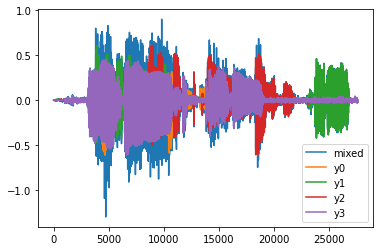WAV separation
Contents
WAV separation#
This tutorial is available as an IPython notebook at malaya-speech/example/multispeaker-separation-wav.
This module is language independent, so it save to use on different languages.
[1]:
import malaya_speech
import numpy as np
from malaya_speech import Pipeline
import matplotlib.pyplot as plt
import IPython.display as ipd
Multispeaker separation description#
FastSep-WAV only able to separate 8k sample rate.
FastSep-WAV trained to separate 4 unique speakers.
Trained on VCTK, Nepali, Mandarin and Malay mixed speakers.
List available FastSep-WAV#
[2]:
malaya_speech.multispeaker_separation.available_deep_wav()
INFO:root:Tested on 1k samples
[2]:
| Size (MB) | Quantized Size (MB) | SISNR PIT | |
|---|---|---|---|
| fastsep-2 | 78.7 | 20.5 | 14.156882 |
| fastsep-4 | 155.0 | 40.2 | 19.682500 |
Load model#
def deep_wav(model: str = 'fastsep-4', quantized: bool = False, **kwargs):
"""
Load FastSep model, trained on raw 8k wav using SISNR PIT loss.
Parameters
----------
model : str, optional (default='fastsep-4')
Model architecture supported. Allowed values:
* ``'fastsep-4'`` - FastSep 4 layers trained on raw 8k wav.
* ``'fastsep-2'`` - FastSep 2 layers trained on raw 8k wav.
quantized : bool, optional (default=False)
if True, will load 8-bit quantized model.
Quantized model not necessary faster, totally depends on the machine.
Returns
-------
result : malaya_speech.model.tf.Split class
"""
[3]:
model = malaya_speech.multispeaker_separation.deep_wav('fastsep-4')
Load quantized model#
[4]:
quantized_model = malaya_speech.multispeaker_separation.deep_wav('fastsep-4', quantized = True)
WARNING:root:Load quantized model will cause accuracy drop.
Generate random mixed audio#
[5]:
import random
import malaya_speech.augmentation.waveform as augmentation
sr = 8000
speakers_size = 4
def read_wav(f):
return malaya_speech.load(f, sr = sr)
def random_sampling(s, length):
return augmentation.random_sampling(s, sr = sr, length = length)
def combine_speakers(files, n = 5, limit = 4):
w_samples = random.sample(files, n)
w_samples = [read_wav(f)[0] for f in w_samples]
w_lens = [len(w) / sr for w in w_samples]
w_lens = int(min(min(w_lens) * 1000, random.randint(3000, 7000)))
w_samples = [random_sampling(w, length = w_lens) for w in w_samples]
y = [w_samples[0]]
left = w_samples[0].copy()
combined = None
for i in range(1, n):
right = w_samples[i].copy()
overlap = random.uniform(0.98, 1.0)
len_overlap = int(overlap * len(right))
minus = len(left) - len_overlap
if minus < 0:
minus = 0
padded_right = np.pad(right, (minus, 0))
left = np.pad(left, (0, len(padded_right) - len(left)))
left = left + padded_right
if i >= (limit - 1):
if combined is None:
combined = padded_right
else:
combined = np.pad(
combined, (0, len(padded_right) - len(combined))
)
combined += padded_right
else:
y.append(padded_right)
if combined is not None:
y.append(combined)
maxs = [max(left)]
for i in range(len(y)):
if len(y[i]) != len(left):
y[i] = np.pad(y[i], (0, len(left) - len(y[i])))
maxs.append(max(y[i]))
max_amp = max(maxs)
mix_scaling = 1 / max_amp * 0.9
left = left * mix_scaling
for i in range(len(y)):
y[i] = y[i] * mix_scaling
return left, y
[6]:
from glob import glob
wavs = glob('speech/example-speaker/*.wav')
wavs.extend(glob('speech/vctk/*.flac'))
len(wavs)
[6]:
23
[18]:
left, y = combine_speakers(wavs, speakers_size)
len(left) / sr, len(y)
[18]:
(3.45525, 4)
[19]:
ipd.Audio(left, rate = sr)
[19]:
[20]:
plt.plot(left, label = 'mixed')
plt.plot(y[0], label = 'y0')
plt.plot(y[1], label = 'y1')
plt.plot(y[2], label = 'y2')
plt.plot(y[3], label = 'y3')
plt.legend()
plt.show()

Predict#
def predict(self, input):
"""
Split an audio into 4 different speakers.
Parameters
----------
input: np.array or malaya_speech.model.frame.Frame
Returns
-------
result: np.array
"""
[21]:
%%time
y = model.predict(left)
y.shape
CPU times: user 20.5 s, sys: 1.68 s, total: 22.2 s
Wall time: 3.51 s
[21]:
(4, 27642)
[22]:
%%time
quantized_y = quantized_model.predict(left)
quantized_y.shape
CPU times: user 20.8 s, sys: 1.73 s, total: 22.5 s
Wall time: 3.45 s
[22]:
(4, 27642)
Results#
[23]:
ipd.Audio(y[0], rate = sr)
[23]:
[24]:
ipd.Audio(y[1], rate = sr)
[24]:
[25]:
ipd.Audio(y[2], rate = sr)
[25]:
[26]:
ipd.Audio(y[3], rate = sr)
[26]:
Quantized results#
[27]:
ipd.Audio(quantized_y[0], rate = sr)
[27]:
[28]:
ipd.Audio(quantized_y[1], rate = sr)
[28]:
[29]:
ipd.Audio(quantized_y[2], rate = sr)
[29]:
[30]:
ipd.Audio(quantized_y[3], rate = sr)
[30]:
